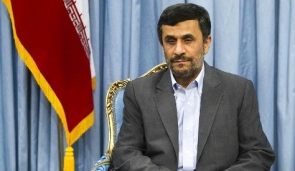By DPA
Ahmadinejad says Israel, U.S. will 'collapse' in near future
Ahmadinejad accuses Israel of being the main factor in regional and global insecurity on day marking 22nd anniversary to the Islamic revolution in Iran.
Iranian President Mahmoud Ahmadinejad on Friday predicted the disappearance of Israel and the United States in the near future, saying he was certain the nations would soon collapse.
"I am certain that the region will soon witness the collapse of Israel and the U.S.," Ahmadinejad said in a speech at the shrine of Ayatollah Ruhollah Khomeini, the late supreme leader of the 1979 Islamic revolution.
June 4 marks the 22nd anniversary of the takeover by the ayatollah, who was subsequently replaced in June 1989 by Ayatollah Ali Khamenei as Iran's supreme leader.
Ahmadinejad accused Israel of being the main factor in regional and global insecurity and blamed the administration of U.S. President Barack Obama for supporting the Jewish state.
The UN atomic agency is voicing growing concern about possible military aspects of Iran's nuclear program and Western envoys believe it may firm up its suspicions later this year, adding to pressure on Tehran.
An independent assessment by the International Atomic Energy Agency on whether Iran has carried out nuclear weapons research could lend weight to any renewed sanctions push by Western powers who suspect it is seeking the means to build such arms.
Sources say new information is reportedly enabling IAEA chief Yukiya Amano to draw 'deeper and more substantive conclusions' on the possible military aspects of Iran's nuclear program.
IAEA Director General Yukiya Amano "makes clear that more information is coming in to him, that he and his inspectors are able to draw deeper and more substantive conclusions," a senior diplomat said.
"It is very relevant to the debate on where we go next in terms of being able to further tighten the screws on Iran in the sanctions context," the diplomat said.
Iran, already under four rounds of UN sanctions over its nuclear program, denies it is seeking the bomb and says its nuclear activities are solely aimed at power generation, medicine and agriculture. It has repeatedly refused to halt uranium enrichment, which can have civilian or military uses.
Amano has taken a blunter approach than his predecessor, Mohamed ElBaradei, saying in his first report on Iran in 2010 he feared it may be working to develop a nuclear-armed missile.
The Japanese agency chief repeated that view in a quarterly Iran report issued last week, saying he had new information about possible undisclosed nuclear-related activities.
He wrote to the head of Iran's Atomic Energy Organization urging him to help answer the IAEA's queries and grant inspectors prompt access to officials, sites and equipment.
Diplomats said the May 6 letter was a signal to Tehran to cooperate or face a possible assessment by the IAEA on the likelihood it had carried out military-related nuclear work, based on the evidence available to the UN body.
Nuclear weapons trigger
For several years, the IAEA has been investigating Western intelligence reports indicating Iran had coordinated efforts to process uranium, test explosives at high altitude and revamp a ballistic missile cone so it can take a nuclear warhead.
Iran says the information is forged or taken out of context.
The latest IAEA report spelled out in more detail seven areas of particular concern where the agency wants clarification from Iran, including experiments to produce a burst of neutrons.
"The latest IAEA report includes evidence that what originally were thought to be just paper studies also include actual experiments, including on triggers for a nuclear weapon," proliferation expert Mark Fitzpatrick said.
Diplomats drew parallels between the way Amano is handling the Tehran dossier and how he has dealt with suspicions of covert nuclear work in Syria, which the IAEA's 35-nation board may soon report to the UN Security Council.
Faced with nearly three years of Syrian stonewalling of an agency probe into a desert site bombed by Israel in 2007, Amano concluded for the first time in a May 24 report that the wrecked complex was "very likely" to have been a reactor.
That assessment was issued after Damascus rebuffed Amano's appeal, in a letter to its foreign minister late last year, for UN inspectors to gain access to Dair Alzour and related sites.
The senior Western diplomat saw a similar pattern in the IAEA's treatment of the Iran and Syria files, underlining that non-cooperation was not a viable strategy for either.
Asked how the IAEA may approach Iran, the diplomat said the agency may state it "has enough information and subjected it to a sufficient depth of analysis to say it looks highly probable there was work going on to introduce military applications".
Another Western envoy painted a similar picture, suggesting the IAEA may present a fuller assessment on possible military aspects to Iran's nuclear program in a report later this year.
The Iranian president caused international condemnation in 2005 when he said that Israel should be eliminated from the Middle East map and transferred to Europe or North America.
International isolation of the Islamic republic escalated after Ahmadinejad held a Holocaust conference in 2006 in which he questioned that the killing of 6 million Jews in Europe during World War II had ever happened.



No comments:
Post a Comment